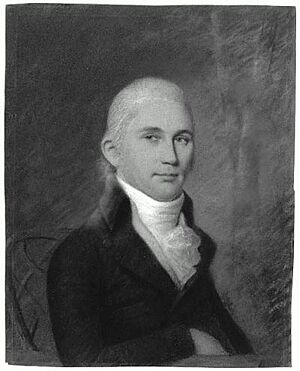Joseph Dennie facts for kids
Quick facts for kids
Joseph Dennie
|
|
|---|---|

Portrait of Joseph Dennie by James Sharples, c. 1790
|
|
| Born |
Joseph Dennie
August 30, 1768 |
| Died | January 7, 1812 (aged 43) |
| Other names | Oliver Oldschool Academicus Socialis |
| Education | Harvard College |
| Occupation | Author, journalist, editor, secretary |
|
Notable credit(s)
|
The Lay Preacher Port Folio |
Joseph Dennie (born August 30, 1768 – died January 7, 1812) was an important American writer and journalist. He lived during the early years of the United States, known as the Federalist Era. Dennie is best known for his essays called The Lay Preacher. He also started and edited The Port Folio, a very successful magazine of its time.
The Port Folio was the most respected literary magazine in the country. It was also the first major political and literary journal in the United States. Many people admired Dennie's writing. Some even called him "the Addison of America."
Contents
Joseph Dennie's Early Life
Joseph Dennie was born in Boston, which was then part of the Province of Massachusetts Bay. His family was well-off. His mother's family, the Greens, were famous printers in early America.
When he was seven, his family moved to Lexington. In 1783, he returned to Boston to study business. Later, he prepared to attend Harvard College. A Reverend Samuel West helped him get ready for college. West encouraged Dennie's love for books and writing.
College Days at Harvard
In 1787, Dennie started at Harvard College. He was very popular with his classmates. However, he didn't get along well with his teachers. In 1789, he was suspended for six months for insulting the faculty.
After graduating in 1790, Dennie found it hard to get a job. By 1793, he was practicing law, but he didn't earn much money. In 1794, he became a reader for the Episcopalian church in Charlestown, New Hampshire. He still wanted to practice law and soon opened his own law office there.
Joseph Dennie's Writing Career
During the 1790s, Dennie wrote for different magazines. These included the Federal Orrery and the Massachusetts Magazine. He often used different pen names, like Academicus and Socialis. People really liked his writing.
In 1795, Dennie was encouraged to start his own literary magazine called The Tablet. A printer named William Spotswood helped him. This kind of magazine was a new idea back then. It was popular with important people in Boston. But The Tablet only lasted a few months, publishing thirteen issues.
The Lay Preacher and The Farmer's Weekly Museum
Even though The Tablet failed, Dennie didn't give up. He started writing The Lay Preacher essays. The first one appeared in The Farmer's Weekly Museum. This New Hampshire newspaper was a leading literary journal in the 1790s.
Dennie became the editor of the Museum in 1796. Under his leadership, the paper's readership grew a lot. It reached readers from Maine all the way to Georgia. The paper supported the Federalist viewpoint. Federalists were one of the first political parties in the U.S. They believed in a strong central government.
Dennie often worked with his friend Royall Tyler. They wrote a funny column together called "The Shop of Messrs. Colon and Spondee." In 1798, Dennie lost money when the paper's printer went out of business. He stayed on as editor for a short time but was soon replaced. After he left, the paper's readership dropped quickly.
Starting The Port Folio
Later in 1798, Dennie tried to run for Congress but lost. He turned down offers to edit other major journals because he didn't want to work for a Democratic paper. Instead, he became the personal secretary to Timothy Pickering, who was then the United States Secretary of State.
Once in Philadelphia, Dennie started editing again for the Gazette of the United States. This was another Federalist-friendly newspaper. In 1800, Dennie and a bookseller named Asbury Dickens started The Port Folio. Dennie wrote for it under the pen name Oliver Oldschool, Esq.
In 1803, Dennie wrote a strong criticism of Jeffersonian democracy. This led to him being charged with criticizing the government. He wrote that a democracy could lead to problems like civil war. However, Dennie was talking about the kind of "democracy" seen in France at the time, which was very different from the republican democracy we have in the United States today. He was found not guilty of the charges. After this, the criticisms in Port Folio became less harsh.
Joseph Dennie's Passing
Joseph Dennie had health problems throughout his life. His father passed away in September 1811. Dennie was very sick himself at the time and couldn't attend the funeral, which made him very sad.
He got a little better for a short time. But he became gravely ill again and passed away four months after his father. Joseph Dennie died on January 7, 1812. He was buried two days later at St. Peter's Church, Philadelphia. His epitaph, or tombstone inscription, was written by John Quincy Adams. The epitaph mistakenly says he was born in Lexington, Massachusetts. He was actually born in Boston, but his family moved to Lexington soon after.
Works
- The Lay Preacher (essays)
- The Port Folio (journal, as founding editor)
 | Janet Taylor Pickett |
 | Synthia Saint James |
 | Howardena Pindell |
 | Faith Ringgold |

